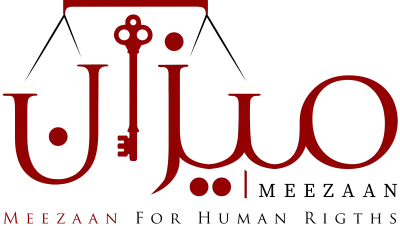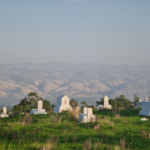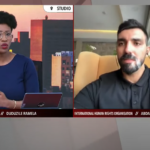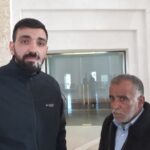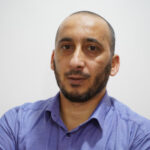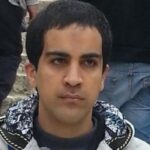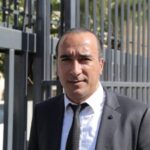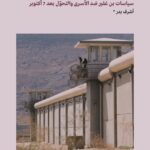Saturday 11, may 2013, Meezaan Association for human rights received a European parliamentary delegation from the council of Euro-Palestinian relations, in Nazareth. The director of Meezaan, Adv. Abdul Raouf Mawaasi and a number of the Meezaan’s lawyers, received the delegation whose visit was aimed at getting an insight into the problems and concerns facing the Palestinians inside the green line in light of the racism of Israel, continuing the escalation of racial discrimination against the Palestinians day after day.
The delegation, representing a number of European countries parliaments such as Ireland, Belgium, Britain, Lithuania and members from the European parliament, who are at the same time members of the Euro-Palestinian relations council, first visited the offices of Meezaan Association situated in Nazareth. There, the director welcomed the delegation stressing the importance of the visit and at the same time valuing the important different roles played by the representatives, particularly the European parliament. The director also presented an outline of the role of Meezaan, along with its activities, in the field of defending human rights in the country.
Dr. Hasan San-Allah, a researcher in the Centre for Contemporary Studies, delivered a lecture to the delegation. He firstly presented a definition of the Palestinians inside the green line, through data backed by figures centring around the Palestinian community inside the green line, thereby comparing the situation of Arabs with that of the Jewish community in the country. He emphasized that although Palestinians comprise 20% of the total population, yet are denied access to services that would reflect this percentage. This is apparent in the employment of Palestinians in Israeli companies, Israeli universities, structural schemes and industrial zones, let alone the suffering of Palestinian women and children inside the green line and not giving full rights to academics pertaining to learning, work, and admission to universities.
Mr. Hassan Tabajah, a lawyer at Meezaan, gave a lecture on the Reunification law. A law passed by the Israeli government and has been in effect since 2002 up to the present day. It forbids Palestinian couples inside the green line from meeting with those outside the green line, in addition to a set of racist laws aimed at the Palestinians inside the green line. He also touched on ‘Present Absentee’ law, passed by the Israeli government in the early fifties of the last century, in order to claim control over and expropriate lands belonging to Palestinian refugees and displaced Palestinian persons. He also addressed the issue of those internally displaced within the green-line area in that they had been displaced from their villages in 1948, and are still denied the right to return to their lands and homes in the villages from which they were displaced. He further dealt with laws designed in accordance with the desire of the Israeli government to exclusively benefit Jewish citizens, and other laws aimed against Palestinians.
Thereafter, the delegation proceeded to its second stop in Kufor Manda to meet with the president of the High Follow-up Committee for the Arab citizens, Muhammad Zaidan. There, the delegation was received by Mr Muhammad Zidan – the president -and a number of the committee members. Zaidan welcomed the delegation and appealed to them to stand with the Arabs inside the green line against the racist Israeli policies from which they have been suffering.
The committee members presented adequate and sufficient explanations centring on such policies, on top of which were: land expropriation, house demolition, absence of industrial zones, Reunification law, many racist laws that have been passed recently, as well as the extent of influence of the local Arab authorities. The committee members also particularly spoke about the suffering of those living in the Negev who are facing the worst of Israel’s schemes aimed at their displacement from their lands, which will occur under the banner of the Prawer–Goldberg law, which entails the expropriation of 80,000 hectares and the displacement of nearly 30,000 Arab citizens living in those lands.
The committee’s president and members expressed their ” surprise at the position the different European countries, as well as the European Union, have taken with regards to the Israeli policies of committing crimes and massacres against Palestinians in Gaza, in addition to building settlements in the west bank, and tightening control over those in Jerusalem, as well as the plans aimed at taking control of al-Aqsa mosque”. In his speech to the delegation, Zaidan asserted :
“Each member of the European delegation has a particular position in his country or in the European parliament, and therefore it is important that the delegation listen to us, from here rather than from far, directly on what is happening to us. We are certain that the delegation members and Europeans in general, must have heard things completely different to what we in fact suffer from, especially given the fact that the Israeli media has very strong holds in the West and Europe. This is because getting to see the facts on the ground isn’t the same as hearing about them from outside. The media is under the control of Zionist organisations. From our experience, the media largely affects people’s convictions and thoughts. European media, in turn, is largely influenced by the picture the Israeli media paints. The Zionist militias wiped out more than 580 Palestinian villages, displacing its peoples after having committed massacres that weren’t shown to the world as they should have been. This is because the Zionist propaganda declared the slogan that Palestine has been a land without a people [Palestinians] for a people [Jews] without a land. Let alone the hundreds of thousands of hectares that have been expropriated from Palestinians in spite of them still having the ownership documents which date back to the time of the Outman empire and British mandate. The Zionist entity has also attempted to separate us from our roots in the Arab, Muslim and Palestinian world. It has set curriculums unfamiliar to, and far from being part of, our culture”.
In his speech, sheikh Raed Salah, the leader of the Islamic Movement, asserted that “The establishment of Israel came as a result of the large support provided by the European countries. On top of which was Britain, in that it has provided Israel with weapons and munitions, and still does so until the present day. France, also, backed Israel with nuclear weapons. Germany, in turn, has supposed Israel by providing submarine warfare. Also, committing the Jenin massacre in 2002 which was a crime against humanity, the Operation Cast Lead was a crime against humanity, let alone attacking the Mavi Marmara in spite of having supporters with European passports on board, and Israel has been maintaining the blockade on Gaza since 2006. The West Bank, in turn, is packed with settlements, which the official position of Europe condones. My question is: Where can this Palestinian state be established? And yet, Israel hasn’t been charged with any of the crimes mentioned. My question is: which is stronger, is it the law or the Zionist project? What we see in the official European position is that it may well adopt a stance, but at the same time ignore another which is collective. While the whole world asked for Gilad Shalit’s release, there are still 5000 Palestinian prisoners in the Israeli jails. Is talking about establishing a Palestinian state a real talk or just a trick to buy more time?! “.
In his speech, sheikh Hammad Abu Daabes spoke about the religious persecution the Palestinian community suffer inside the green line, especially the mosques and churches that had been demolished during and after the Nakba (1948 catastrophe). He said, “These sacred places were turned by Israel into bars, night clubs, cattle pens, and many of which have been closed down, let alone the prevention from renovations of others as well as not being allowed to use them. We also suffer from the religious figures being under pursuit”.
In turn, Talab Abu Araar, a Knesset member, related to the conditions of Arabs in the Negev who suffer from having hundreds of thousands of their lands expropriated, their villages going unrecognized, depriving them from basic services. “They have also been facing alarming schemes since the establishment of this state, the latest of which is that of the Begin-Prawer. Furthermore, the disparities between Arabs and Jews, in all fields; education, health, infrastructure and others, is a clear one, in which Israel works systematically for that matter”.
The members of the delegation showed interest in all the issues addressed by Zidan and the committee members. That is, the importance of joint action, as well as addressing such issues in the different parliaments across Europe and the European Union parliament. Hack Dix, a delegation member and a member in the British House of Lords, said that the reason being for not taking a decisive European stance towards the policies of Israel is due to the existing disputes and differences in positions between the different European countries. He stressed the importance of conveying an authentic picture to the European nations and the different parliaments across Europe, as well as the European Union parliament, in order to expose the racist Israeli system as well as the system of religious prosecution aimed against Muslims and Christians across the country. He also clarified the fact that the visit, which the delegation is undertaking, will generate consequences and there will be cooperation and constant communication with the Palestinian leaders and institutions inside the green line.
During his speech, another delegation member, David Martin – a member in the European parliament, said that they had learnt a lot about the suffering of Palestinians inside the green line. He said:
“The president of the European Committee for Foreign Affairs and I led a campaign in the European Union two years ago. There are serious talks and trends in the European Union to reconsider the agreements signed between the union and Israel, due to the many violations committed by Israel in light of the Operation Cast Lead on Gaza, especially the human right violations seen by delegation in all aspects. The delegation will do what it takes to address the tribulations and sufferings, experienced by the Palestinians inside the green line, to the European human rights organizations and the European Union. Based on what the delegation heard from the leaders inside the green line, it is possible to work towards putting pressure on Israel to stop these violations.
I believe that the European Union is capable of doing a lot. I wouldn’t have learnt about the extent of suffering of the Palestinians inside the green line as citizen in this state, had it not been for my visit here”.
Leonidas Donskis, a member of the delegation as well as the Lithuanian and European parliament, said that he was accused of being anti-Semite when he asked for the cancellation of the cooperation contract between the European Union and Israel. He promised that the delegation would urge the European nations to establish justice in the interest of the Palestinian people.
The delegation then proceeded to al Bassa village situated in Western Galilee, where sheikh Tayseer khalidi explained about the displaced village of al Bassa.
The delegation was able to closely see the extent of damage and destruction caused by the Zionist gangs in 1948. While the mosque and church of the village await imminent collapse, no renovations are allowed. They are still there to symbolize a model of co-existence between Muslims and Christians in the village, said Khalidi while recounting the history of the village. The sheikh also talked about the number of villagers, as well as the massacre that was committed against them. He also highlighted the strategic importance of the village given its location on the Lebanese borders and the sea coast. Al Bassa it is one of the villages situated in the District of Safad in the north of Acre, and is the second largest village in the district in that its population reached nearly 2850 Palestinians in 1954.
The delegation, along with Meezaan, then proceeded to the city of Acre. They were received by sheikh Muhammad Maadi – the imam of the Al Ramil mosque and the president of Acre Association for Education and Development -, as well as Mr Sami Hawarie – the president of Yatir Association for Culture – who gave a power point presentation to the European delegation, explaining about the city of Acre and the problems it is facing, given that the city is inhabited by both Arabs and Jews. Thereafter, sheikh Maadi gave a speech centring around the role of the Islamic movement in building, renovating and maintaining a number of institutions, as well as helping poor families by providing finical and moral support in light of the pressure placed by official Israeli institutions such as the municipality, Amidar’s company for construction and other companies seeking to make it difficult for the Arabs living in Acre, seeking to displace them under the pretext that homes are no longer sustainable and can collapse at any second.
At the end of the trip the delegation and Meezaan embarked on, the director of Meezaan – advocate Abdul Raouf Mawassi – expressed his gratitude to the European delegation for the kind gesture and for having visited Palestinians inside the green line to learn about their concerns and problems, hopping that there will always be a mutual relationship between the two sides. Mr Mawassi stressed the importance of serious work and mobilizing in order to stop the ongoing human rights violations being committed by Israel against Palestinians and their lands.
